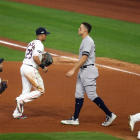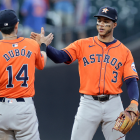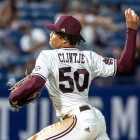HOUSTON -- The New York Yankees are going home for the winter. After a thrilling ninth-inning comeback, the Yankees lost ALCS Game 6 on Jose Altuve's walk-off home run Saturday night (HOU 6, NYY 4). Houston has won its second American League pennant in three years.
Despite all the questions about their pitching -- legitimate questions -- the Yankees held the Astros to 22 runs in six games in the ALCS. If you'd have told me that would happen before Game 1, I would've assumed the Yankees won the series. Their pitching did more than enough to keep the Yankees in the ALCS.
The Yankees are heading home mostly because their offense went silent after Game 1, especially with men on base. New York was the best hitting team with runners in scoring position and men on base in general during the regular season, but, from Games 2-6, the offense went 3 for 24 with runners in scoring position, including 1 for 6 in Game 6.
In addition to the general lack of timely hits, the Yankees made too many mistakes in the ALCS, particularly in Game 6. The Astros are far too good to give an extra out or an extra 90 feet. The Yankees did that repeatedly in Game 6 and it cost them their season. Here are New York's four biggest unforced errors, listed chronologically.
1. Playing the infield back in the sixth inning
With the season on the line, a one-run deficit in the sixth inning has to stay a one-run deficit. If that means using your best reliever out of his usual inning, so be it. Keeping that deficit to one-run is imperative.
The Yankees went to Tommy Kahnle in the sixth inning down a run -- with that appearance, Kahnle became the first Yankee to pitch three consecutive days this season -- and seven pitches later, the Astros had runners at corners with no outs. An Altuve walk and Michael Brantley single did the trick.
At that point the Yankees elected to play the infield back and go for the double play rather than potentially cut the runner down at the plate. Playing the infield in is risky because if a ground ball gets through, there's the potential for a big inning. When your season is on the line though, you have to take uncomfortable risks.
Sure enough, Alex Bregman hit a ground ball to shortstop to get the runner home from third for an important insurance run. Didi Gregorius looked home despite playing back, and that little hesitation cost the Yankees the double play. Bregman beat it out. They didn't cut the run down at the plate or get the double play. Ouch.
Not playing the infield in allowed the Astros to tack on a run there. That's not a second guess either. It was obvious the Yankees should have brought the infield in as soon as there were runners on the corners. They played it passively and it led to a run.
"Tommy gave up a run, a little bit of a product of him probably being a little tired, too, at this point, having used him a lot here these last few days," Yankees manager Aaron Boone said.
2. Judge getting doubled up
Do you know how many times the Yankees had the tying or go-ahead run at the plate in Game 6? Twenty-two times. Twenty-two plate appearances with at least the tying run at the plate. One of those instances came in the seventh inning inning, after Aaron Judge shot a leadoff single over Carlos Correa's head at shortstop.
Two batters later, Aaron Hicks lifted a blooper to shallow left field that was in no man's land. Bregman was shifted toward shortstop and Brantley was playing toward the left-center field gap. Brantley managed to make the diving catch, and then doubled Judge off first base for the inning-ending double play. Here's the video:
An incredible play by Brantley. He's not exactly known as a defensive wizard in left field, but he was able to charge in, leave his feet, and take a hit away from Hicks. Brantley made a tremendous play and deserves major props.
The mistake here belongs to Judge, clearly. He wandered all the way to second base on a shallow pop-up hit in front of him. It's not like it was behind him to right field, you know? He had a clear view of the play as it developed. I get wanting to be aggressive down two runs, but Judge was a little too aggressive there, and it cost his team a precious baserunner in the late innings.
"Try to do whatever I can to put our team in a better position to win'," Judge said after Game 6. "As 'a leader of this team, I've got to step up, I've got to do something about that.''
3. Sticking with Encarnacion
The Yankees and Astros were two of the highest scoring teams in baseball during the regular season and they combined to hit .197/.283/.351 in the ALCS. Several players on both sides had poor series. Yordan Alvarez, Gary Sanchez, Brett Gardner, Yuli Gurriel, on and on we could go.
On New York's side, no one looked worse than Edwin Encarnacion, who went 0 for 3 with a walk and three strikeouts in Game 6 and 1 for 18 with 11 strikeouts in the ALCS. His at-bats were non-competitive and even his balls in play were not hard-hit. After hitting 34 homers during the regular season, it was like the 36-year-old suddenly got old between the ALDS and ALCS.
Even with Giancarlo Stanton nursing a quad injury -- Boone said sitting Stanton in Game 6 was his decision, though it seems likely he was covering for his injured player -- the time had come for the Yankees to make a change at DH. Cameron Maybin was on the bench, or the Yankees could've put Sanchez at DH and Austin Romine behind the plate.
Not only did the Yankees keep Encarnacion in the lineup, he hit in the middle of the order throughout the postseason. Judge, DJ LeMahieu, and Gleyber Torres were on base a ton in the ALCS and Encarnacion did not make the Astros pay. The Yankees showed a little too much loyalty to a respected veteran even though he was overmatched all series.
4. Pitching to Altuve
Aroldis Chapman fell apart in the blink of an eye. After two quick outs to start the ninth inning, Chapman walked George Springer on five pitches, then fell behind in the count 2-0 on Altuve. He threw six straight pitches out of the zone.
The Yankees and Chapman had two options at that point. One, bear down and try to get Altuve, or pitch around him and go after Jake Marisnick, who replaced Brantley defensively earlier in the game. Pushing the winning run into scoring position is a tough pill to swallow. It's also Altuve vs. Marisnick, the latter a guy who hit .232 with a .289 on-base percentage during the regular season.
The Yankees went after Altuve. After a get-me-over slider to steal a strike, Chapman hung a slider up in the zone, which Altuve hit for the pennant-clinching walk-off home run. To the action footage:
Chapman's fastball command disappeared -- the final four of those six consecutive balls were fastballs up and away to right-handed batters -- making it easy for Altuve to sit slider. When he loses feel for his fastball, Chapman will drop that slider in, and it looked to me that Altuve was sitting on it.
"I couldn't believe it," Chapman said after the game. "I couldn't believe that that hit happened at that moment and left the field. I couldn't believe it."
Getting beat by Marisnick would've bad, especially after pushing the winning run to second base by pitching around Altuve, but it's also the difference between facing an elite player with your season on the line rather than a bench guy with your season on the line. Once Chapman fell behind in the count 2-0 on Altuve, it was time to reset and go after Marisnick.
"Certainly not a walk, an intentional walk situation, but kind of pitching him aggressively like you're ahead the whole time," Boone said when asked about pitching around Altuve. "And I think Chappy did, he just hung a breaking ball. That's obviously a pitch he's trying to not give in and probably get down and out of the zone, see if you get a chase or something and he hung it."
The Yankees wasted opportunities early in the ALCS -- most notably, they blew a lead in Game 2 and stranded the bases loaded in the first inning in Games 3 and 4 -- which contributed to their postseason exit. In Game 6, they wasted too many rallies early and also made way too many unforced errors. Errors that cost them outs, runs, the game, and, ultimately, their season.


















